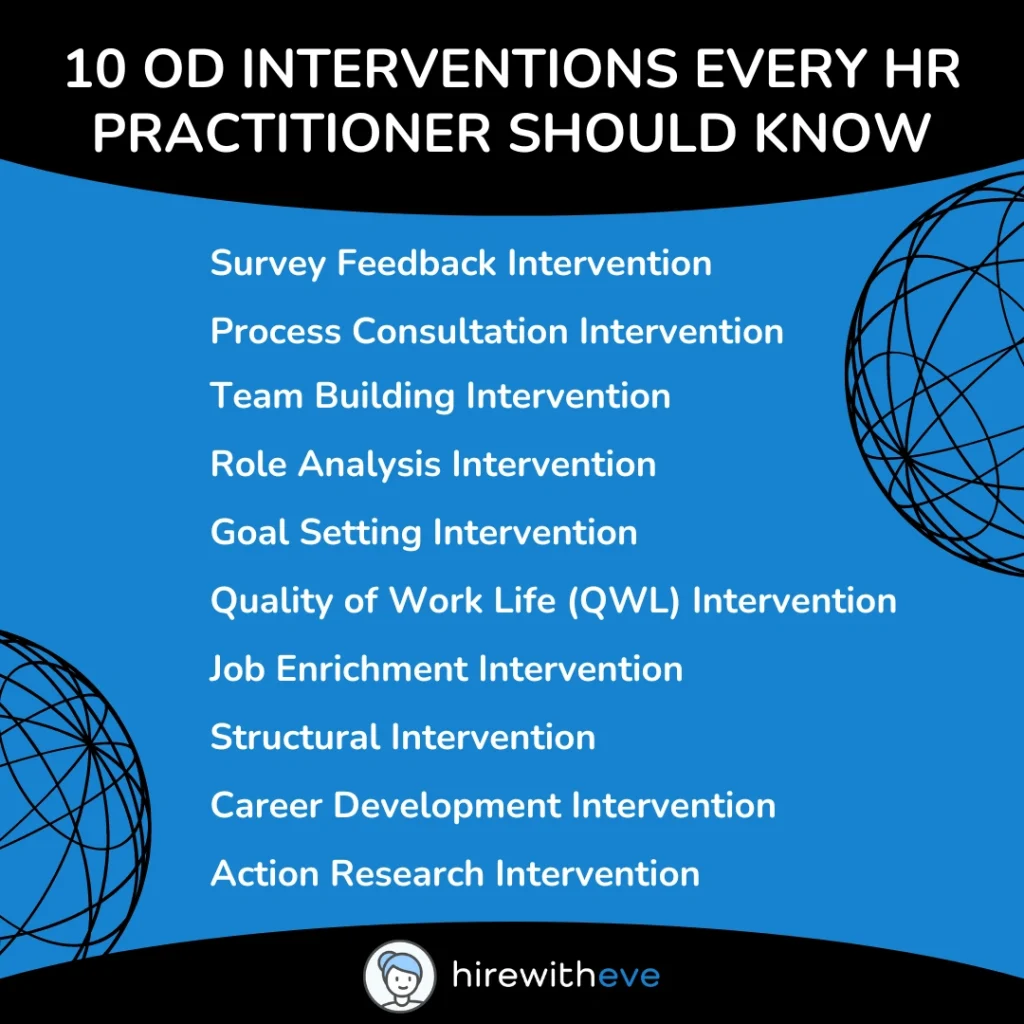10 OD Interventions Every HR Practitioner Should Know

In today’s dynamic work environment, Organizational Development (OD) is a critical aspect of business growth. OD Interventions are structured activities designed to improve a company’s effectiveness and align it with strategic goals. HR professionals and talent acquisition specialists play a pivotal role in driving these interventions to create a more engaged, productive, and adaptable workforce.
With the increasing complexity of organizations, understanding the most effective OD Interventions is essential to fostering sustainable growth and managing change efficiently.
In this blog, we will explore 10 essential OD Interventions every HR practitioner should be aware of, with insights on how these interventions can positively impact organizational performance.
What Are OD Interventions?
OD Interventions, or Organizational Development Interventions, are planned and systematic activities or processes aimed at improving an organization’s effectiveness and health. These interventions are designed to address specific issues within a company, such as improving communication, increasing productivity, enhancing job satisfaction, or resolving conflicts.
They are typically led by HR professionals or organizational development experts who work closely with employees and management to implement these structured changes. OD Interventions can take many forms, including team-building activities, process consultations, feedback mechanisms, and structural changes.
The main goal is to align the organization’s people, processes, and culture with its strategic objectives, ensuring sustainable growth and adaptability in a constantly changing business environment.
What are the 10 OD Interventions Every HR Practitioner Should Know?

Survey Feedback Intervention
Survey feedback is one of the foundational OD Interventions designed to collect information from employees on various aspects of the organization, such as leadership effectiveness, job satisfaction, and workplace culture. HR practitioners use the data collected to identify areas for improvement and to create action plans that align with the company’s goals.
Through open communication and feedback loops, this intervention allows HR professionals to make evidence-based decisions, fostering transparency and trust across the organization.
Process Consultation Intervention
Process consultation is an OD Intervention that focuses on understanding and improving interpersonal and group processes within an organization. The role of HR is to facilitate this intervention by engaging with teams to diagnose challenges related to communication, decision-making, and conflict resolution.
This intervention is particularly effective in resolving deep-rooted issues in team dynamics and improving collaboration. It allows HR professionals to guide employees toward better processes, resulting in increased productivity and morale.
Team Building Intervention
Team building is a popular OD Intervention aimed at improving team cohesiveness and performance. By organizing structured activities, HR professionals help teams better understand each other’s strengths, weaknesses, and working styles.
Effective team-building interventions lead to improved communication, trust, and collaboration within teams. For talent acquisition specialists, it’s also a crucial tool for integrating new hires into the organization, helping them align with the company’s culture and goals.
Role Analysis Intervention
Role analysis intervention helps clarify job roles and responsibilities, reducing ambiguity in the workplace. When employees have a clear understanding of their roles, it minimizes confusion and duplication of effort, improving overall efficiency.
HR practitioners use role analysis as an OD Intervention to ensure employees are aligned with organizational objectives and have the resources they need to perform effectively. Clear role definition also aids in performance evaluation and career development, making it easier for employees to see their growth path within the company.
Goal Setting Intervention
Goal setting is an essential OD Intervention where HR professionals work with employees and management to set clear, measurable goals that align with the organization’s strategic objectives. This intervention fosters a sense of purpose and direction among employees.
By ensuring that each department and individual has clear goals, HR can monitor progress and adjust strategies as needed to drive performance. Talent acquisition specialists can also leverage this intervention to align new hires’ goals with company expectations from the outset.
Quality of Work Life (QWL) Intervention
Quality of Work Life (QWL) interventions are aimed at improving the workplace environment, focusing on job satisfaction, work-life balance, and overall employee well-being. For HR professionals, creating an environment where employees feel valued is crucial to retention and productivity.
By implementing QWL interventions, companies can reduce employee turnover and improve engagement, making them more attractive to potential candidates. This is particularly beneficial in today’s competitive talent market, where quality of work-life is a significant consideration for job seekers.
Job Enrichment Intervention
Job enrichment is an OD Intervention that enhances employee satisfaction by increasing job responsibilities and providing opportunities for personal growth. HR professionals implement this intervention by redesigning roles to include more meaningful work, autonomy, and learning opportunities.
Job enrichment not only motivates employees but also improves their commitment to the organization. It creates a more stimulating work environment, leading to higher retention rates and a more engaged workforce.
Structural Intervention
Structural interventions focus on changing the organization’s structure to improve efficiency and adaptability. Whether it’s decentralizing decision-making, reorganizing departments, or modifying reporting relationships, HR plays a key role in facilitating these changes.
HR practitioners need to ensure that structural changes are communicated clearly and implemented smoothly to minimize disruption. This intervention is particularly useful during periods of rapid growth or when adapting to new market conditions.
Career Development Intervention
Career development interventions are essential for nurturing talent within the organization. HR professionals create pathways for employee growth, helping them acquire new skills and advance their careers.
Through career development programs, companies can retain top talent and ensure that employees feel invested in their future with the organization. This intervention also aids in succession planning, ensuring the organization has the right talent ready to take on leadership roles when needed.
Action Research Intervention
Action research is a participatory OD Intervention that involves employees in identifying problems, developing solutions, and implementing changes. This collaborative approach ensures that interventions are grounded in real organizational issues and are more likely to be successful.
HR professionals facilitate this process by gathering data, engaging employees in discussions, and working together to implement improvements. Action research fosters a culture of continuous improvement and employee involvement, both of which are essential for long-term organizational success.
Conclusion
As HR professionals navigate the complexities of implementing OD Interventions, platforms like HirewithEve.ai provide valuable support. The platform’s skills-based hiring tools ensure that talent acquisition aligns with the organization’s strategic goals. By integrating analytics and feedback features, HirewithEve.ai helps HR professionals monitor the effectiveness of interventions such as survey feedback, goal setting, and career development. Additionally, the platform’s focus on employee engagement makes it easier to foster a high-quality work life for employees, a critical aspect of OD Interventions.
Whether it’s aligning new hires with strategic goals or tracking employee performance, HirewithEve.ai is an essential partner for HR professionals implementing OD Interventions.
